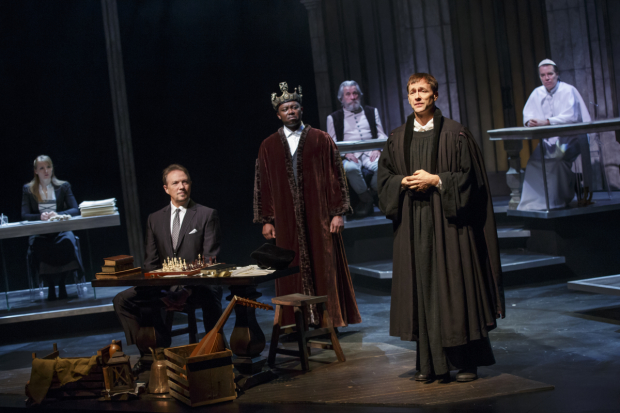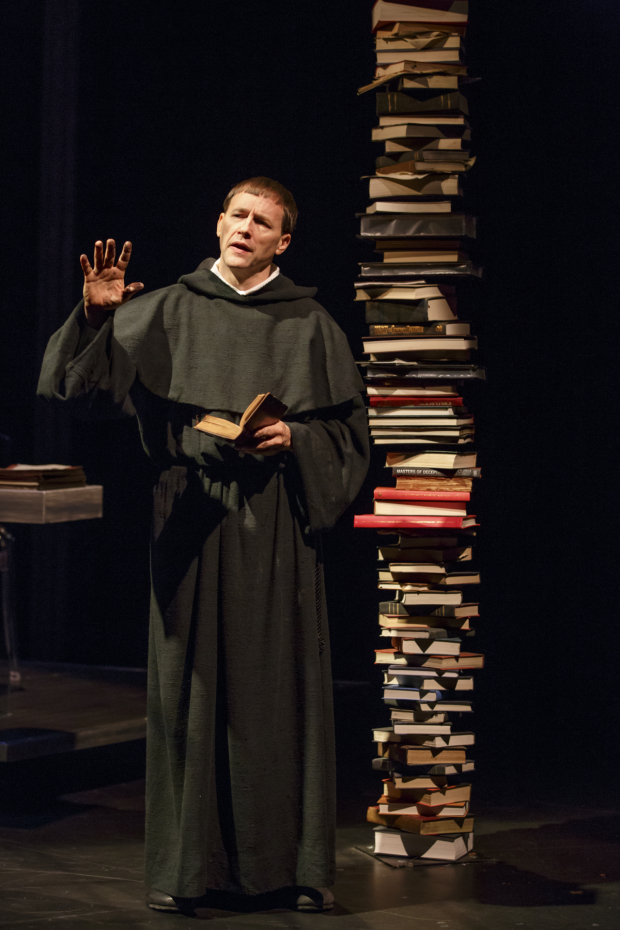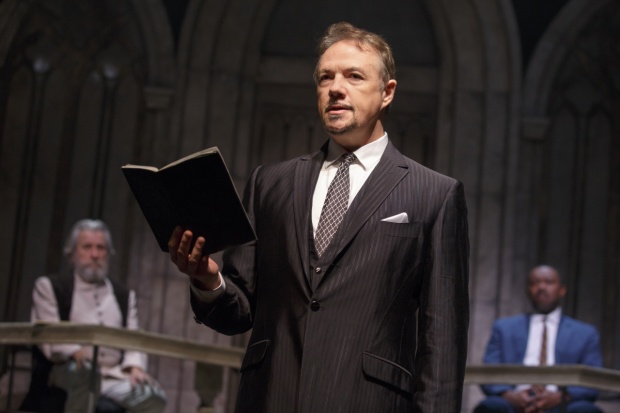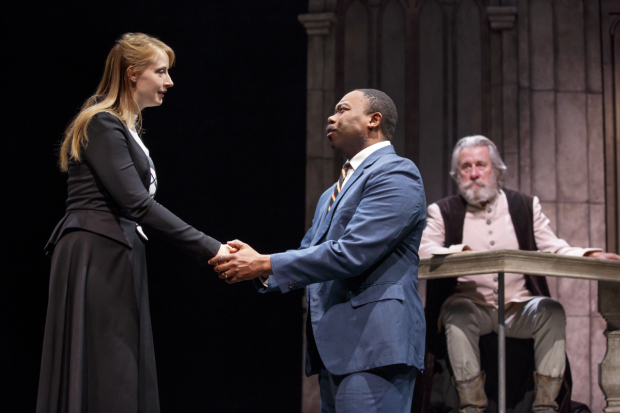Martin Luther on Trial

(© Joan Marcus)
Saint Peter, Pope Francis, and the Devil walk into a courtroom in Chris Cragin-Day and Max McLean's fantastical and fascinating new play, Martin Luther on Trial, now playing at the Pearl Theatre in a production of Fellowship for Performing Arts (a Christian theater company now in its second New York season). Just in time for the 500th anniversary of the Protestant Reformation, this drama makes up for its rough edges by being consistently imaginative, intelligent, and provocative.
Taking place at the crossroads of heaven and hell, the play imagines Lucifer (Paul Schoeffler) as an ambitious prosecutor. In his crosshairs is Martin Luther (Fletcher McTaggart), the renegade Catholic monk who started the Protestant Reformation. Luther stands accused of blasphemy against the Holy Spirit, and if he is found guilty, the Devil will drag him to hell. Saint Peter (John Michalski) acts as judge while Luther's own wife, Katie (Kersti Bryan), serves as defense attorney. They call witnesses like Adolf Hitler (a surprisingly funny Mark Boyett) and Martin Luther King Jr. (a stately Jamil A.C. Mangan) in an effort to determine if Luther's defiance of the Roman Catholic Church was a crime against God resulting in 500 years of sectarian bloodshed.

(© Joan Marcus)
Interspersed within the courtroom scenes are flashbacks depicting Luther's life: the papal corruption that led him to post his 95 Theses of the church door at Wittenberg and the imperial politics that embittered him near the end of his life. Displaying a remarkable grasp of their subject, Cragin-Day and McLean are able to use their time-and-space-defying genre — let's call it magical historical fiction — to connect the dots between religion, politics, psychology, and art as they relate to the Lutheran legacy.
The sheer volume of information in this play occasionally leads to some clunky exposition: The devil awkwardly asks his first witness, the one wearing a floor-length leather trench coat and a toothbrush mustache, "To confirm. You are, indeed, Adolf Hitler, Führer of Nazi Germany and the Holocaust?" Cragin-Day and McLean could safely prune some of these shaggy descriptors without losing anything.
This is especially true thanks to the work of director Michael Parva, who choreographs this complex ballet of ideas with clarity and precision. He artfully employs dimension shifts and magical special effects in a way that deepen the themes of the play while keeping the story on track. One might criticize the whole event as completely contrived, but that misses the point: In its invention, Martin Luther on Trial delivers high drama by grappling with giant issues of democracy and authority, credibility and control —problems very much unresolved in 2016.
Admirably, the playwrights never soft-pedal Luther's more unsavory traits, including his virulent anti-Semitism. Rather than giving us the Hollywood biopic version of Luther, McTaggart plays him as slovenly and unpleasant. A smug grin creeps across his face when he thinks he is speaking to an intellectual lesser. With a permanent growl in his voice, he angrily dictates his rage into religious treatises. Yet in more private moments, McTaggart's unsteady, almost childlike delivery suggests that Luther has constructed this mighty fortress of words to protect him from gnawing doubt.

(© Joan Marcus)
Although no less forceful, Bryan's Katie is far more sympathetic: We are ready to canonize her by the end for putting up with her awful husband. Always ready with the comic relief, Michalski plays a tangible and earthy Peter. Using his resonant baritone as his primary weapon, Schoeffler gives a commanding performance as Satan, playing off the anger and fear of the people around him in a way that feels seductive and convincing. Audience members might find themselves nodding in agreement with this devil in a three-piece suit.
Beyond the modern dress of the courtroom, Nicole Wee has designed attractive period costumes: Heavy velvet robes and fabulous hats parade across stage like a medieval runway show. Kelly James Tighe's set is equally grand, with flying buttresses and pointed archways suggesting a Gothic church. Peter and the witnesses sit in the chancel, but where an altarpiece would normally appear, there's a doorway to an unknown realm. Unfortunately, this ethereal basilica is marred by the presence of transparent plastic chairs that look as though they were stolen from a Thai restaurant. Peter couldn't spring for something from the Pier 1 rectory collection?

(© Joan Marcus)
Geoffrey D. Fishburn's ghostly lighting helps to fully realize the supernatural courtroom, while sharp boxes of light solidify Parva's staging. Quentin Chiappetta's cinematic sound design ensures that every scene transition is pristine: Flashbacks regularly begin with a dramatic note of tension, like an ecclesiastical spinoff of Law & Order. While there are a few misfires, Chiappetta's muscular underscoring regularly aids the performances in establishing an essential mood.
Audience opinion of Luther will certainly be divided upon exiting the theater, but like all good plays of this type, that is by design. With Martin Luther on Trial, Fellowship for Performing Arts offers something that has been sorely missing from the New York theater scene for far too long: high-quality, challenging theater from a Christian perspective. Most impressively, FPA presents its play without resorting to syrupy evangelism, which would feel forced and false. They let the drama lead the way, allowing us to debate what we have witnessed on the trip home.











